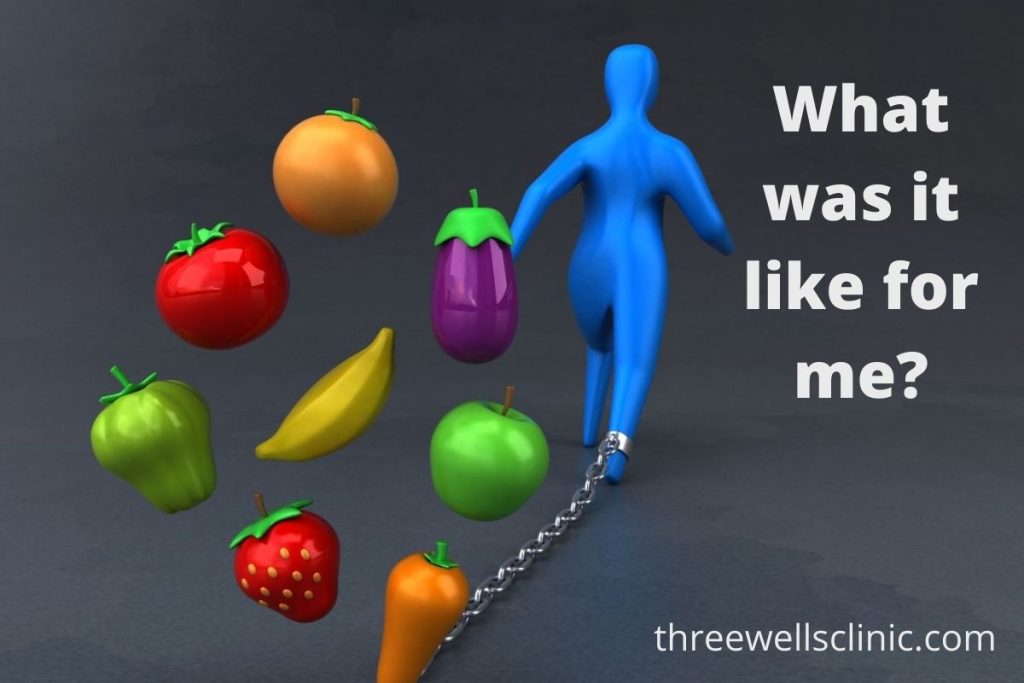In a previous blog post, I shared with you about my being diagnosed with an eating disorder called orthorexia nervosa. (If you missed it, click here.)
Here’s a little more of how it came to be and what it was like for me…
I have clear memories of disordered thinking about food, exercise, and body image starting at age 10 when I hit puberty, my first diet was soon after.
What started as chronic dieting, turned into compulsive eating, and then fully into orthorexia.
In my late 30s I had vowed to myself NO MORE DIETS! and then focused on “clean eating” and a “healthy lifestyle,” which turned out to be code words for more dieting.
My profession encourages this way of thinking and these behaviors. Grad school for acupuncture and my first years in practice ended up accelerating and worsening the orthorexia.
As I’m now 48, this had been my way of life for at least 38 years!
My most common symptoms:
- Restriction pendulum: I can restrict for a while but there is always a rebound effect where I compulsively eat “bad” foods. I’ve never binged or purged; it was just more than I thought I should have of foods I shouldn’t have.
- My “bad” foods to restrict were always changing. In my teens: fat and high-calorie. 20s: meat. 30s & 40s: carbs and sugar. Various stints with gluten-free, dairy-free, etc. Not to mention all the cleanses.
- My success at restriction got shorter and shorter. Where I used to be able to follow a plan for a year or more, I could no longer follow anything more than 2 weeks before “failing.”
- Worry that someone would see what I put in my grocery cart, make judgments on what I eat out in public, or heaven forbid, see me in a drive-thru line.
- Every Monday morning religiously checking and logging my weight, blood pressure, and blood sugar trying to ward off a family history.
- Major sweet cravings in the evenings leading me to think I had a sugar addiction. (Not so!)
- Weight cycling: the length of time maintaining any weight loss got shorter and shorter and I regained more than I lost.
- Countless hours of webinars and reading on nutrition.
- Obsessive meal planning and meal prep, hours reading recipe books and food blogs looking for the better “healthy lifestyle” plan.
- Feeling morally self-righteous when I ate “healthy” and guilty/shamed when choosing “bad” foods.
- Overly focused on what I thought my husband should or shouldn’t be eating.
Whew!
With all of these symptoms, you would think I was a rolled-up ball of non-functioning anxiety.
But all this time, I thought I was doing okay-ish. It was so internalized, so ingrained to my core, that I just thought, “this is the way it is.”
It’s very much like having the news running on TV or on the radio all day long. It’s background noise that’s always there, so you ignore a lot of it.
But you don’t realize how much noise and stress it’s making until you turn it off and feel the silence for the first time.
And I can say already at this point in my recovery, the silence is lovely!
I went undiagnosed for so long because of several reasons:
- Most medical practitioners are not trained to look for or identify eating disorders, and especially orthorexia. They can even be triggering for more disordered thinking and eating.
- My symptoms hid under the guise of “clean eating” and “healthy lifestyle”.
- I thought I was doing good things for my body that I didn’t fully recognize my own distress about it.
- I believed the myth that thin = healthy and healthy = thin.
- I am currently in a larger body so I do not fit the image of a restrictive eating disorder.
- I believed the lie that my lack of success was “all my fault.” That I failed. And failed. And failed.
We are all swimming in a sea of diet culture. It is in every aspect of our lives – in the media, among our friends and families, and especially in healthcare.
It is a complex issue that affects us individually and collectively.
Get the newsletter!
Stay up-to-date with Three Wells latest news, events, as well as tips to help improve your overall health, wellness, and lifestyle!
This post may contain affiliate links, meaning I may receive a commission (at no extra cost to you) if you use that link to make a purchase. See my disclaimer.
Is Three Wells right for you?
Get a free 15 minute Q&A consultation to find out!
